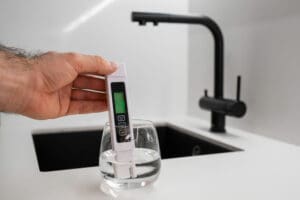Why Columbus Businesses Should Test Their Water Quality

For Columbus, OH, businesses, ensuring the quality of water is not just a necessity; it’s a commitment to health and excellence. With growing national concerns about contaminants and the impact of water quality on both health and business operations, understanding why and how to test water quality becomes paramount.
Water quality testing is more than just checking for clarity. It’s about safeguarding health, maintaining operational efficiency, and ensuring regulatory compliance. Office H2O is here to shed light on why Columbus businesses should prioritize water quality testing. Whether you’re running a bustling office building, a state-of-the-art warehouse, or a large manufacturing plant, understanding the nuances of water quality can make a significant difference.
So, let’s explore the factors that define water quality, the specific challenges faced by businesses in the area, the process of testing, and the myriad benefits it brings. By the end, you’ll see the compelling reasons to prioritize water quality testing and how it aligns with the values of health-conscious individuals and businesses.
Understanding Water Quality
Water quality is determined by various factors that affect its suitability for consumption and use. These factors include the presence of chemical contaminants, pathogens, and physical properties such as turbidity and temperature. Health-related parameters often focus on harmful substances like lead, nitrates, and bacteria that can pose serious health risks if consumed in high quantities.
Poor water quality can lead to numerous health issues, ranging from gastrointestinal diseases to long-term conditions like organ damage. For businesses, this means potential liability and a tarnished reputation if customers or employees fall ill due to contaminated water. Beyond health, poor water quality can corrode equipment, increase maintenance costs, and disrupt operations, affecting the overall efficiency and profitability of a business.
Understanding and managing water quality is crucial for Columbus businesses. The city’s water system may face specific challenges related to its infrastructure and environmental factors. Businesses need to be aware of these to mitigate risks and ensure they provide safe, clean water for all their operations and customers.
Common Water Issues in Columbus
Another prevalent issue is rust, often a direct result of aging infrastructure and corroding pipes. Rust can contaminate water supplies, leading to unsightly discoloration and potential health risks if consumed over time. Furthermore, many municipalities, including Columbus, add fluoride to water systems for dental health benefits; however, excessive fluoride can also pose health concerns, prompting debates over its safety and necessity.
Lastly, white specks in water—often calcium deposits—can occur due to hard water conditions prevalent in the area. While these deposits may not pose immediate health risks, they can cause scaling in appliances, leading to decreased efficiency and increased maintenance costs. Addressing these issues is essential for ensuring the quality of water and maintaining a safe and effective business environment.
As Columbus residents, you’re probably already fully aware of several common water quality issues that can affect operational integrity and health safety. One significant concern is the presence of algae, which can thrive in stagnant water or during warmer months. Algae blooms not only contribute to unpleasant odors and tastes but can also release toxins harmful to health.

The Significance for Columbus Businesses
Ohio faces unique water quality challenges that require attention from local businesses. Factors such as aging infrastructure, industrial activities, and seasonal variations can affect the quality of water supplied to businesses. These challenges underscore the importance of regular water quality testing to ensure safety and compliance with health standards.
Certain industries in Columbus heavily rely on pristine water quality, especially when it comes to their drinking water. Manufacturing plants, warehouses, and corporate offices need to ensure that their water meets health standards, as even minor contaminants can affect taste, safety, and customer satisfaction. Medical facilities, such as dental offices, also depend on high-quality water to maintain hygiene and provide a safe environment for their patients.
By prioritizing water quality testing, businesses across the area can address these challenges head-on. It not only ensures the safety and satisfaction of customers but also safeguards the business from potential health scares and legal consequences. In a city where water quality can vary, proactive testing becomes an essential practice for long-term success.
Local Regulations and Compliance

Like any state, Ohio abides by specific EPA regulations that govern water quality standards for businesses. These regulations are designed to protect public health and ensure that water used in commercial settings meets safety criteria. Businesses also must adhere to the Ohio Environmental Protection Agency’s regulations to maintain clean drinking water in their establishments.
Compliance with local water quality regulations not only prevents legal issues but also builds trust with customers. By demonstrating a commitment to safety and quality, businesses can enhance their reputation and foster loyalty among health-conscious individuals. This is a competitive advantage in today’s market, where consumers prioritize businesses that align with their values.
Understanding the regulatory landscape is the first step for Columbus businesses. Staying informed about any updates or changes in water quality standards is crucial. Regular testing, documentation, and transparency in water quality management reflect a business’s dedication to compliance and public welfare.
Why Water Quality Testing is Essential for Businesses
Ensuring optimal water quality is not just a regulatory compliance issue for businesses but a fundamental aspect of fostering a safe and healthy workplace. Regular water quality testing helps identify potential contaminants that could compromise employee health, ranging from microbial hazards to industrial pollutants. In high-stakes environments where water is consumed or used in day-to-day activities, proactive testing becomes essential to mitigate risks associated with poor water quality.
Businesses should aim to conduct water quality tests at least quarterly, though more frequent testing may be advisable for those in areas with known water quality issues or those that experience significant variations in water quality throughout the year. This regular testing will not only highlight immediate contaminant levels but also track shifts over time, thus allowing for timely interventions.
Furthermore, employing state-of-the-art filtration technology, such as bottleless water coolers from Office H2O, can further enhance water safety and quality in the workplace. These systems provide access to pure, filtered water while reducing the hazards associated with traditional bottled water, such as contamination during handling and storage. By installing advanced filtration technology, businesses not only ensure clean drinking water for their employees but also contribute to a more sustainable environment by reducing plastic waste. Plus, you’ll save on operational costs for your business by eliminating bottled water storage and delivery fees.
Benefits of Regular Testing
Regular water quality testing offers both immediate and long-term benefits for businesses. First and foremost, it ensures the safety of customers and employees, reducing the risk of health-related incidents. In turn, this enhances customer satisfaction and builds trust, encouraging repeat business and positive reviews.
Another significant benefit is the reduction of operational costs. By identifying and addressing water quality issues early, businesses can prevent damage to equipment, reduce maintenance expenses, and avoid costly shutdowns. This proactive approach leads to a more efficient and resilient operation.
Lastly, regular testing improves a business’s overall reputation. Health-conscious consumers are more likely to support businesses that prioritize safety and quality. Demonstrating a commitment to water quality can set a business apart from competitors, attracting a loyal customer base that values transparency and responsibility.
Quenching Thirst With Quality
As you can see, water quality testing is a vital practice for Columbus businesses aiming to prioritize health and excellence. Understanding the factors that influence water quality, complying with regulations, and conducting regular tests can have far-reaching benefits for businesses and their customers alike.
By prioritizing water quality testing, businesses can ensure the safety and satisfaction of their customers, reduce operational costs, and enhance their reputation. For health-conscious individuals seeking businesses that align with their values, water quality is a significant factor in their decision-making process.
Ready to check out Office H2O’s bottleless water and ice, and commercial ice machines? Contact our team today.
